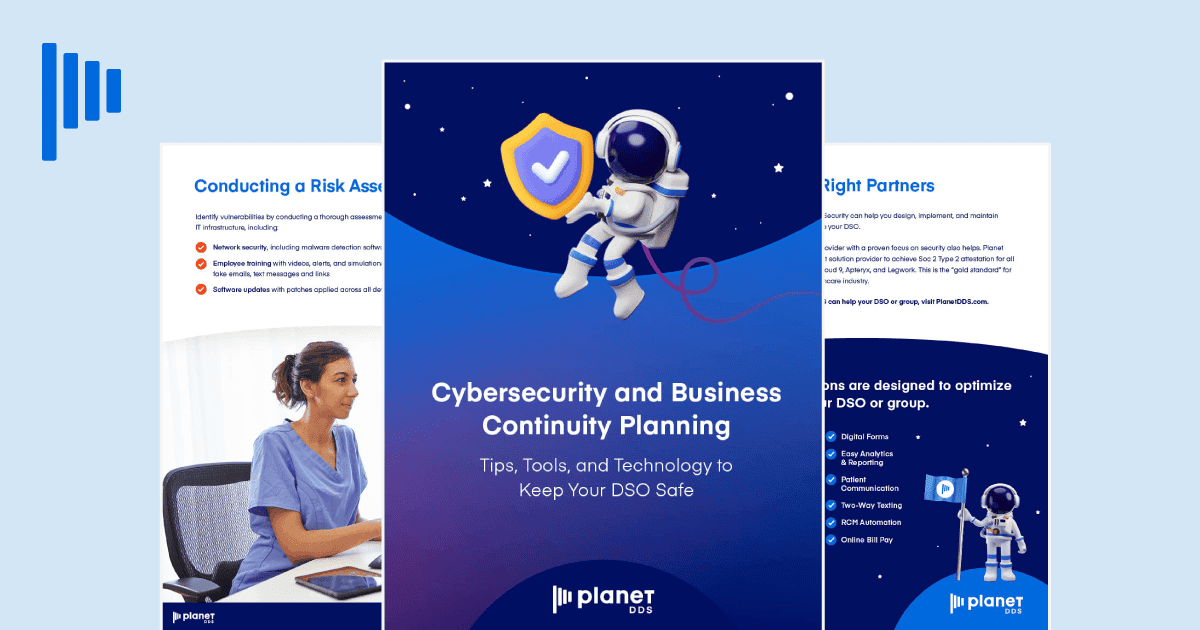Cybersecurity: Best Practices to Keep Your DSO Safe

Cyberattacks on dental service organizations (DSOs) are becoming more frequent and increasingly sophisticated. Tactics like phishing emails disguised as doctor referrals, new patient paperwork, or vendor-related announcements such as product recalls are common entry points.
Understanding how to protect your DSO is crucial not just for compliance, but also for maintaining trust with your patients. This e-book explores cybersecurity and the critical steps DSOs can take to secure their systems, safeguard patient information, and prevent costly breaches.
What Can a Cyberattack Cost Your DSO?
A single cyberattack can lead to significant financial losses for a DSO. According to Gary Salman, CEO of Black Talon Security, it typically takes about ten business days to recover from a ransomware attack. In a recent case, a DSO with fourteen locations faced a $2 million ransom demand. Even smaller security incidents can easily surpass $100,000 in recovery costs.
Cybersecurity firms like Black Talon Security report handling numerous cases involving compromised patient data, unauthorized access to financial information, and the disabling of entire networks, which can leave employees locked out of vital systems.
Common Cyberthreats in Dentistry
DSOs must be vigilant in identifying common cyberthreats that could jeopardize their operations. Data breaches can lead to identity theft, financial loss, and severe damage to your organization’s reputation. Three common entry points are:
- Phishing attacks: Emails designed to steal login credentials or financial details, often containing malicious links or attachments
- Ransomware: Malicious software that encrypts data, demanding a ransom for access
- Data breaches: Unauthorized access to patient information due to weak passwords or unpatched systems
These threats are not only increasingly common but also particularly damaging due to the sensitive nature of the data involved, making robust security practices crucial for DSOs.
5 Ways to Combat Cyberthreats
To protect against these threats, DSOs need a proactive cybersecurity approach. The following five strategies provide essential steps for reducing security risks and strengthening your organization’s defenses against cyberattacks:
1. Conduct a risk assessment.
Begin by assessing vulnerabilities in the current IT infrastructure. This should include network security, malware detection, and email filtering tools. Employee training is also crucial, ensuring the team can recognize suspicious emails and links. Keeping software updated with security patches is another critical measure for mitigating risks.
2. Build a cybersecurity framework.
Establish clear cybersecurity policies that address both technical and human vulnerabilities. This should include guidelines for data protection, acceptable use of technology, and incident response. Strengthening network security with firewalls, encryption, and multi-factor authentication (MFA) can help reduce technical risks. Regular vulnerability scans and penetration tests are equally important.
3. Create an incident response plan.
An incident response plan (IRP) outlines how to handle a cyberattack. It should include procedures for reporting incidents, contact information for key personnel, and a plan for communicating with employees and patients during the recovery process. Regular training and mock exercises help ensure employees are familiar with the plan.
4. Develop business interruption recovery strategies.
In the event of an attack, time is crucial. Establish protocols for documenting and reporting the incident, including key details such as when it was discovered and what systems were affected. This information will assist cybersecurity experts, law enforcement, and insurance companies in the recovery process.
5. Partner with experienced cybersecurity firms.
Cybersecurity firms can help you design, implement, and maintain a framework tailored to your DSO. Selecting a practice management provider with a proven focus on security in dentistry also helps. Planet DDS holds SOC 2 Type 2 certification for all of its products, including Denticon, Cloud 9, Apteryx, and Legwork. This is the “gold standard” for stringent data protection in the healthcare industry.
Cybersecurity Solutions for DSOs
Implementing these best practices is necessary for reducing the risk of cyberattacks and ensuring the long-term protection of your organization’s sensitive data. DSOs that prioritize cybersecurity not only safeguard their patient information but also ensure business continuity, even in the face of growing threats.
As cyberattacks continue to evolve, taking a proactive approach becomes increasingly necessary to maintain operational stability and protect your reputation. To learn more about how Planet DDS can help secure your DSO, contact our team to set up a demo today.


